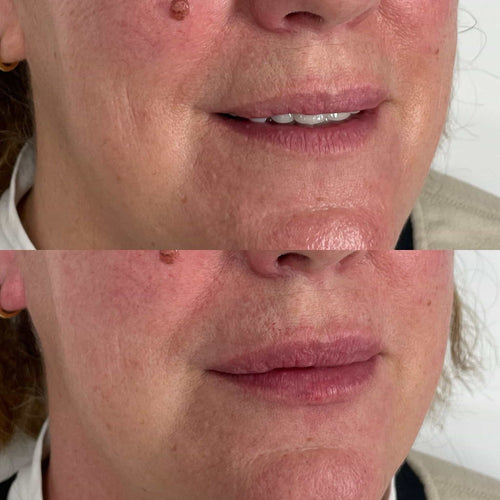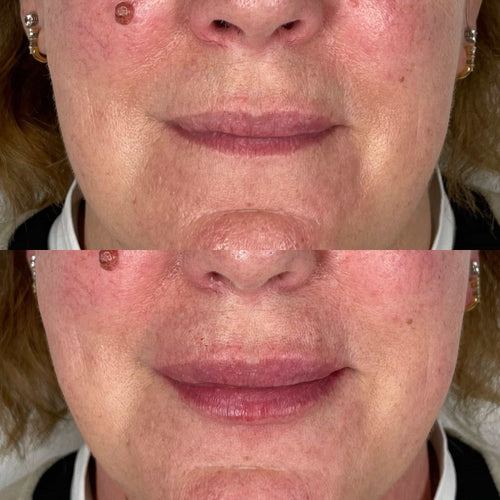Schedule a Dermal Filler Consultation with Dr. Laura Geige
Possible Effects of Pregnancy on Lip Fillers
Book a Consultation for Dermal Fillers with Dr. Laura Geige Today
Hormonal Fluctuations
Pregnancy can significantly impact a woman’s body, including her skin and the effects of cosmetic procedures like lip fillers.
During pregnancy, hormonal fluctuations are dramatic. These changes can cause increased blood flow, fluid retention, and alterations in collagen production – all factors that can influence how filler behaves.
Increased blood flow often results in swelling throughout the body, which may be more pronounced in areas where fillers have been injected. This can make lips appear larger or more voluminous than intended.
Fluid retention is another common pregnancy symptom. Excess water weight can also lead to swelling in the lips, further amplifying the effects of lip fillers.
Collagen, a protein crucial for skin elasticity and structure, may be affected by hormonal shifts during pregnancy. It’s possible that collagen production decreases, potentially causing fillers to break down faster or appear less defined.
However, individual experiences with lip fillers during pregnancy vary widely. Some women may notice minimal changes, while others experience significant swelling or alterations in the filler’s appearance.
It’s essential for expectant mothers considering lip fillers to consult with a qualified and experienced cosmetic dermatologist or plastic surgeon who specializes in pregnancy-related concerns.
They can assess individual circumstances, discuss potential risks and benefits, and advise on the best course of action.
Let me know if you have any other questions.
Fluid Retention

Pregnancy can significantly affect the body, including alterations in fluid retention and skin elasticity.
Hormonal fluctuations during pregnancy can lead to increased water retention, which may cause swelling throughout the body, including the lips.
This fluid buildup might temporarily make existing lip fillers appear more prominent or swollen.
Here’s a detailed breakdown of the potential effects:
- Increased Fluid Retention: Pregnancy hormones increase blood volume and cause the body to retain more water. This can lead to swelling in various areas, including the lips.
- Changes in Skin Elasticity: Pregnancy hormones can also affect collagen production, leading to changes in skin elasticity. This may make lip fillers appear less defined or more uneven.
- Immune System Response: A pregnant woman’s immune system is naturally heightened. In some cases, this could lead to a slight inflammatory response at the injection site, potentially causing temporary swelling around the filler.
- Individual Variation: The degree of swelling and any changes in lip fillers will vary greatly from person to person. Factors such as pre-existing medical conditions, the type of filler used, and individual hormonal fluctuations can all play a role.
It’s crucial for pregnant women considering lip filler injections to consult with their physician or a qualified dermatologist.
They can assess individual circumstances and provide personalized advice on whether it’s safe and appropriate during pregnancy.
Individual Variation
Pregnancy can indeed cause changes to the body, including swelling and fluid retention. This can potentially affect the appearance of lip fillers.
Here’s a breakdown of the possible effects of pregnancy on lip fillers:
-
Increased Swelling: Due to hormonal fluctuations and increased blood volume during pregnancy, lips may naturally swell more than usual. This swelling could make existing lip fillers appear more pronounced or cause them to look asymmetrical.
-
Altered Filler Movement: Pregnancy hormones can affect collagen production and skin elasticity. This might lead to the hyaluronic acid filler moving or migrating slightly, altering the shape of the lips.
-
Reduced Absorption: Some studies suggest that pregnant women may have a slower metabolism and decreased breakdown of hyaluronic acid fillers. This could mean the fillers last longer than expected.
It’s important to note that individual experiences can vary greatly. Some women experience minimal changes to their lip fillers during pregnancy, while others notice significant differences. Factors such as the type and amount of filler used, pre-existing swelling tendencies, and hormonal fluctuations can all contribute to this variation.
If you’re pregnant and concerned about the potential effects on your lip fillers, consult with a board-certified dermatologist or plastic surgeon. They can assess your individual situation and provide personalized advice.
Factors Influencing Swelling
Age

Swelling, a common physiological response to injury or irritation, can be influenced by various factors, some of which are particularly relevant during pregnancy.
Hormonal Changes: Pregnancy triggers significant hormonal fluctuations, primarily an increase in estrogen and progesterone levels. These hormones can cause vasodilation (widening of blood vessels), leading to increased blood flow and fluid retention. This contributes to generalized swelling, including in the face.
Increased Blood Volume: During pregnancy, blood volume expands by up to 50% to support the growing fetus and placenta. This increased volume can lead to edema (fluid buildup) in tissues.
Dietary Factors: Consuming a diet high in sodium can exacerbate fluid retention and swelling. Conversely, adequate potassium intake can help balance fluids and reduce swelling.
Lifestyle Factors: Prolonged standing or sitting can contribute to venous pressure, promoting fluid buildup in the legs and potentially affecting facial swelling. Regular exercise, however, can improve circulation and reduce edema.
**Age-Related Factors:**
- Collagen Loss: As we age, collagen production naturally declines. Collagen is a vital structural protein that provides support to tissues. Reduced collagen can make the skin thinner and more susceptible to swelling.
- Skin Elasticity Changes: With age, skin loses its elasticity, making it less able to retain its shape and more prone to sagging or puffiness, which can contribute to an appearance of swelling.
The impact of these factors on lip filler swelling during pregnancy is complex and individual. While hormonal changes are known to increase swelling generally, the extent to which they affect lip fillers specifically requires further research.
Pre-existing Conditions
Swelling is a common side effect of lip filler injections, but several factors can influence the extent and duration of swelling.
Here are some key influences:
-
Amount and type of filler injected: Larger volumes of filler will naturally cause more swelling. Additionally, certain hyaluronic acid fillers tend to produce more swelling than others.
-
Injection technique: Precise placement and minimal trauma to the tissue during injection can help reduce swelling.
-
Individual factors:
-
Age: Younger skin tends to swell more readily than older skin.
-
Skin thickness: Individuals with thinner skin may experience more visible swelling.
-
Metabolism: Faster metabolism can lead to quicker reduction of swelling.
-
Sun exposure: Sunburn or excessive sun exposure can increase inflammation and swelling.
-
-
Medications:
-
Blood thinners: These medications, like aspirin or ibuprofen, can prolong bleeding and increase bruising and swelling.
-
Corticosteroids: While these medications are sometimes prescribed after filler injections to reduce inflammation, they can also suppress the immune system and potentially lead to complications.
-
-
Other medical conditions:
-
Pregnancy and breastfeeding: These states involve hormonal fluctuations and increased blood volume, which can contribute to swelling.
-
Diabetes: Poorly controlled diabetes can impair healing and increase the risk of infection and swelling.
-
Autoimmune disorders: Certain autoimmune conditions can cause inflammation and swelling.
-
It is essential to consult with a qualified and experienced injector to discuss your medical history, current medications, and any potential concerns regarding lip filler injections, especially if you are pregnant or breastfeeding. The injector can help determine the appropriate treatment plan and manage any potential risks.
Filler Type
Swelling after lip filler is a common and typically temporary side effect. Several factors can influence the degree of swelling, including:
• Filler Type: Different fillers have varying compositions and viscosities, which can affect how much they swell.
* Hyaluronic acid (HA) fillers tend to cause more immediate but shorter-lived swelling compared to other types.
• **Injection Technique**: A skilled injector who uses proper techniques minimizes trauma to the tissues, reducing swelling potential. Overfilling can also contribute to excessive swelling.
• Individual Factors**: Swelling response varies from person to person based on factors such as:
- Genetics
- Skin thickness
- Age
- Medications (e.g., blood thinners)
- Overall health
- Smoking
Pregnancy can further influence swelling due to hormonal changes and increased blood volume, potentially leading to more pronounced or prolonged swelling after lip filler.
It’s essential to consult with a qualified medical professional experienced in dermal fillers. They can assess individual factors and advise on the best course of action, considering any potential pregnancy-related considerations.
Reserve Your Dermal Filler Consultation with Dr. Laura Geige Now
Recommendations During Pregnancy
Consult with a Dermatologist
It’s important to prioritize both your health and the health of your baby during pregnancy. Making informed decisions about cosmetic procedures, like lip fillers, becomes even more crucial.
Lip filler injections typically involve using hyaluronic acid, a substance naturally found in the body. While hyaluronic acid itself is generally considered safe, there’s limited research specifically on its effects during pregnancy.
Because of this lack of conclusive evidence, most dermatologists and medical professionals recommend **avoiding lip fillers** and other non-essential cosmetic procedures during pregnancy.
During pregnancy, hormonal fluctuations can significantly impact the skin and body. These changes could potentially affect how your body reacts to filler injections, leading to unexpected or undesirable results.
Additionally, some potential risks associated with fillers, such as swelling and bruising, might be exacerbated during pregnancy.
If you’re considering lip fillers while pregnant, it’s **essential to consult with a dermatologist** who specializes in treating pregnant patients. They can assess your individual health situation, discuss the potential risks and benefits, and provide personalized advice.
Remember, open communication with your doctor is key to ensuring both you and your baby’s well-being throughout pregnancy.
Alternative Enhancements
Lip fillers are a popular cosmetic procedure that involves injecting hyaluronic acid into the lips to enhance their size and shape. While lip fillers can be incredibly effective, there are certain considerations for individuals who are pregnant or planning to become pregnant.
Pregnancy brings about significant hormonal changes that can affect various bodily systems, including the skin. Hyaluronic acid is a natural component of the body, but its effects and how it interacts with pregnancy hormones are not fully understood.
Because of this uncertainty, many doctors **recommend avoiding elective cosmetic procedures**, such as lip fillers, during pregnancy. This is primarily due to the potential for unknown risks to both the mother and the developing fetus.
Some concerns associated with lip filler injections during pregnancy include:
* **Allergic reactions:** Pregnancy can heighten sensitivity to certain substances, increasing the risk of allergic reactions to fillers.
* **Injection complications:** The circulatory changes during pregnancy could make it more difficult to control the filler injection, leading to potential bruising, swelling, or migration of the product.
* **Hormonal influence:**
Pregnancy hormones may affect how the body metabolizes and reacts to the hyaluronic acid in lip fillers. This could result in unpredictable changes in the filler’s appearance or longevity.
If you are considering lip fillers during pregnancy, it is crucial to consult with your doctor or a qualified dermatologist. They can assess your individual health history, risks, and benefits before making a recommendation.
Remember, prioritizing the health of both yourself and your baby should always be the top priority.
Realistic Expectations
During pregnancy, hormonal fluctuations can significantly impact the body, including skin elasticity and fluid retention. While lip fillers are generally considered safe during pregnancy when administered by a qualified medical professional, it’s essential to understand that swelling is a common occurrence.
Increased blood volume and circulatory changes can lead to facial swelling, potentially making existing lip fillers appear more pronounced or uneven. Hormones can also affect the way your body responds to dermal fillers, sometimes leading to quicker breakdown or shifting of the filler material.
It’s crucial to have realistic expectations about the potential for swelling and discuss this openly with a dermatologist or plastic surgeon experienced in treating pregnant patients. They can assess your individual situation, medical history, and pregnancy stage to determine the best course of action.
If you are considering lip fillers during pregnancy, prioritize seeking professional advice from a qualified healthcare provider who specializes in aesthetic treatments for pregnant women.
Line the Studio Elizabeth Rohrbaugh Otherwheres Magazine My Better Love Fashionably Balanced Emily Patricia Fae
- Can You Travel With THC Soda? TSA Rules And Restrictions - May 9, 2025
- Botox Nefertiti Neck Lift In Dorking, Surrey - May 9, 2025
- Gummy Smile Treatment – Gum Contouring Near Betchworth, Surrey - May 8, 2025
